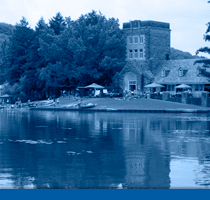GenWiki is a project of the Association for Computer Genealogy, a German group. There are many links of interest to a German family researcher. This web page was formerly called
genealogy.net. It is exclusively in German with no English translation. It includes several sections including a list of regional
genealogy societies in Germany.
The genealogy website for The Church of Jesus Christ of Latter-say Saints (LDS). Includes several sections. All free after registration.
- A massive searchable indexed database of documents from all over the world including German church books and civil registers. Note: many newly indexed data are restricted and require an LDS church member login or attendance at a Family History Center or associate library to view. Some people call this the IGI, but the IGI has long been disbanded, besides the IGI included both documented (indexed) data and patron submitted data. The current database is exclusively data indexed from documents.
- The card catalog of the Family History Library in Salt Lake City with links to digitized images of their massive microfilm library and book library. Note: some microfilm images are only available to LDS church members and some are only available for viewing at an LDS Family History Center.
- A family tree feature that is a single tree for the whole world to use. Anyone may add/change any data entered on anyone. Prime advantage is that most of the entries are backed up by attached documents that should prove the family links. There are hints of new documents to attach to further document the person as new data gets indexed. There is a log of the changes that contains who changed what item and when. Messages may be sent on a FamilySearch message system, but sometimes there is an email address.
- Wiki of many resource items and research helps
- A memories section where you may store images and audio/visial clips.
Archion provides access to a growing collection of digitized records of baptisms, confirmations, marriages and burials for Protestant churches in Germany. The cost is about €20 per month (about US$25)
The website
Matricula Online is a free portal for online images of European church records. It is interdenominational and reaches across geographic borders. Currently, the site provides access to records from several German Catholic dioceses, many parts of Austria and Luxembourg, and a few records from Poland, Serbia, and Bosnia and Herzegovina.
Ortssippenbucher and Ortsfamilienbucher
An ortssippenbuch/ortsfamilienbuch is a book that contains the all families from a particular region. The families are ordered alphabetically then chronologically then numbered. These inexpensive books contain hundreds of families in your village through out the stated period with connections to other families by marriage. If your village has an ortssippenbuch/ortsfamilienbuch you may have a “gold mine” of family data.
To determine if your village has one or more OSB/OFB make a search at the LDS Family History Library card catalog for your village. They will be listed under “genealogies.” You may also look here.
The St. Louis County (MO) Library has an extensive collection of OSB and OFB. You can peruse the collection
here. You will need a local person to look at the book for you. They may not be checked out.
Alternatively, you can search online a find a dealer that has a copy for sale.
Not just for Jewish ancestors, this site provides a gateway for finding villages of origin in Germany and Eastern Europe. The most useful item is the
ShtetlSeeker function that finds villages anywhere in Europe (east and west). Additional features of ShtetlSeeker include a link to Google maps and the ability to make a list of all the features (populated areas, hills, creeks, farms, railroad stations, airports and etc) within a 10 mile radius.
This is the most important of all German gazetteers. The goal of the Meyer’s compilers was to list every place name in the German Empire (1871-1918). It gives the location, i.e. the state and other jurisdictions, where the civil registry office was and parishes if that town had them. It also gives lots of other information about each place. The only drawback to Meyer’s is that if a town did not have a parish, it does not tell where the parish was, making reference to other works necessary. It does provide a list of the adjactent villages and towns where the church might be.The book is exclusively in gothic German, but the web page has translated information.
Regional Resources
There are two sources for emigrees from the region now called Baden-Wuerttemberg. One is the books like Wuerttemberg Emigration Index based on the official records as people asked permission to leave. These data are also on Ancestry($) are searchable . The other is from notes in the church registers that a person or family left on a particular date. This database is the latter and is free.
Includes DNA resources and links to Pennsylvania and German information.
Landesgeschichtes Informationssystem Hesse. Site includes dictionaries, atlases and maps, views, and bibliographies
The Hamburg Passenger Departure Lists 1850-1934
A large number of German emigrants left from the German ports of Bremen and Hamburg (as well as other European ports). Most of the Bremen passenger departure records were destroyed. But many of the Hamburg lists survive. They are available online at Ancestry($), and some of the lists are available on digitized FamilySearch microfilm.



